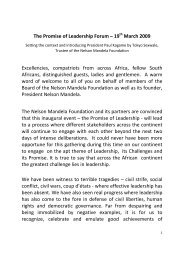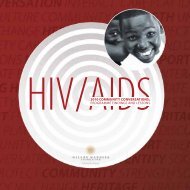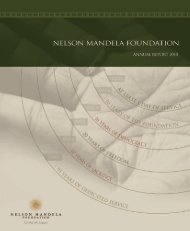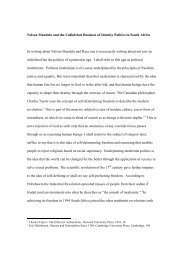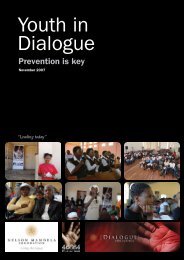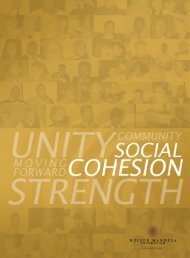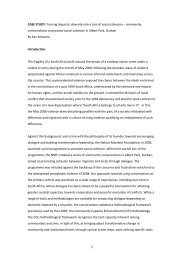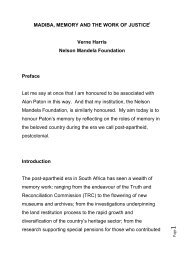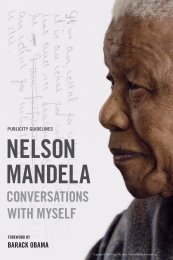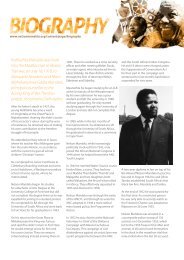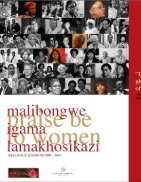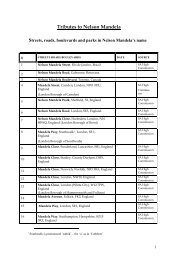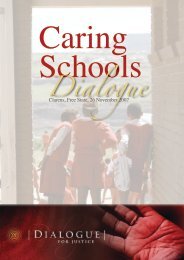Archives at the Crossroads 2007 - Nelson Mandela Foundation
Archives at the Crossroads 2007 - Nelson Mandela Foundation
Archives at the Crossroads 2007 - Nelson Mandela Foundation
- No tags were found...
Create successful ePaper yourself
Turn your PDF publications into a flip-book with our unique Google optimized e-Paper software.
SummaryThe triggers th<strong>at</strong> led to <strong>the</strong> holding of <strong>the</strong> Conference, various contributionsto <strong>the</strong> Conference, and <strong>the</strong> discussions th<strong>at</strong> ensued, point unambiguouslyto an archival system th<strong>at</strong> is under severe strain and to a wider archivesector urgently in need of support.The problems lie in three areas:The political and social role of archive and archiving in a democracyand in facilit<strong>at</strong>ing <strong>the</strong> work of building social cohesion in a diverse andhistorically-fractured society is still not recognized sufficiently, nor is it activelyand system<strong>at</strong>ically fostered in and by government and indeed, in <strong>the</strong> broaderpublic sphere. Fur<strong>the</strong>rmore, many of <strong>the</strong> varied forms and sites of archiveand archiving go unrecognized.Archival work is seriously under-resourced because its significanceis largely unacknowledged.Lack of recognition and under-resourcing result in inadequ<strong>at</strong>e andunintegr<strong>at</strong>ed planning; a low skills-base among personnel; inadequ<strong>at</strong>e recordsmanagement in government departments; absence of clear career-p<strong>at</strong>hs forstaff; poor service delivery; inadequ<strong>at</strong>e conditions of preserv<strong>at</strong>ion; in short,an archival system under strain and not serving South Africa as it should.Unless remedial action is taken soon, <strong>the</strong>re is <strong>the</strong> potential for fur<strong>the</strong>rdeterior<strong>at</strong>ion, even collapse.The records of government are a key instrument of efficient administr<strong>at</strong>ionand planning, and <strong>the</strong> means by which citizens hold governments accountableto <strong>the</strong>m. The archive and archiving are fur<strong>the</strong>r central tools of reconcili<strong>at</strong>ionand of <strong>the</strong> recognition of our common humanity embracing all our diversity.They are sites for <strong>the</strong> ongoing reconsider<strong>at</strong>ion of <strong>the</strong> past in order to enablea better future.We are <strong>at</strong> a crossroads. Right now <strong>the</strong>re is a unique opportunity both to fix<strong>the</strong> problems in <strong>the</strong> system and to use a rethought, 21 st century, postcolonialconcept of archive to underpin <strong>the</strong> urgent n<strong>at</strong>ional project of social cohesion.On <strong>the</strong> o<strong>the</strong>r hand, <strong>the</strong>re is a danger of <strong>the</strong> n<strong>at</strong>ional system being reducedto an observer of poor governance and a loss of historical memory. Wh<strong>at</strong> is<strong>at</strong> stake is not simply <strong>the</strong> survival of <strong>the</strong> inherited documents of <strong>the</strong> past, butour hard-won democracy itself and our possible future as a cohesive society.<strong>Archives</strong> <strong>at</strong> <strong>the</strong> <strong>Crossroads</strong> | 1



